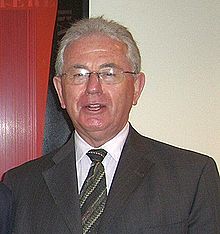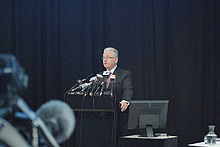- Michael Cullen (politician)
-
The Honourable Dr
Michael John Cullen
Dr Cullen in 2007. 40th Minister of Finance In office
5 December 1999 – 19 November 2008Prime Minister Helen Clark Preceded by Bill Birch Succeeded by Bill English Constituency None (list, formerly St. Kilda) 16th Deputy Prime Minister of New Zealand In office
15 August 2002 – 19 November 2008Prime Minister Helen Clark Preceded by Jim Anderton Succeeded by Bill English Member of the New Zealand Parliament
for St KildaIn office
1981–1996Preceded by William Fraser Succeeded by Seat Abolished Member of the New Zealand Parliament
for Dunedin SouthIn office
1996–1999Preceded by Seat Established Succeeded by David Benson-Pope Member of the New Zealand Parliament
for Labour Party ListIn office
1999 – 29 April 2009Succeeded by Damien O'Connor Personal details Born 5 February 1945
London,
UKPolitical party Labour Spouse(s) Anne Fraser Profession Lecturer Michael John Cullen (born 5 February 1945, London) was a New Zealand politician. He served as Deputy Prime Minister of New Zealand, also Minister of Finance, Minister of Tertiary Education, and Attorney-General. He was the deputy leader of the Labour Party from 1996 until November 2008, when he resigned following a defeat in the general election. He resigned from Parliament in April 2009, to become the deputy chairman of New Zealand Post from 1 November 2009,[1] (and Chairman from 1 November 2010).
Contents
Early life
Michael Cullen migrated to New Zealand while young and attended secondary school at Christ's College in Christchurch, and achieved an MA in History at Canterbury University. Receiving the Commonwealth Scholarship he then gained a PhD in Social and Economic History from the University of Edinburgh. From 1971 to 1981 he was a lecturer at Otago University, with a term as a Visiting Fellow at the Australian National University from 1975 to 1976.[2] On 16 December 2009, he received an honorary LLD from the University of Otago in recognition of "his contributions as an Otago academic and as a respected and highly influential politician".[3]
Member of Parliament
Parliament of New Zealand Years Term Electorate List Party 1981–1984 40th St Kilda Labour 1984–1987 41st St Kilda Labour 1987–1990 42nd St Kilda Labour 1990–1993 43rd St Kilda Labour 1993–1996 44th St Kilda Labour 1996–1999 45th Dunedin South 2 Labour 1999–2002 46th List 2 Labour 2002–2005 47th List 2 Labour 2005–2008 48th List 2 Labour 2008–2009 49th List 2 Labour Cullen joined the Labour Party in 1974, and served on the party's Executive and Council between 1976 and 1981. In 1981 he was elected MP for the Dunedin electorate of St Kilda.
Fourth Labour Government
Main article: Fourth Labour Government of New ZealandWhen Labour entered government in 1984, Cullen became Senior Whip. Due to his knowledge of economics, Cullen became increasingly involved in the disputes surrounding the Minister of Finance, Roger Douglas, who supported the liberalisation of trade and the sale of state assets plus deep tax cuts. These goals, which were against traditional Labour policies, angered both party members and the public. When the Prime Minister, David Lange, attempted to limit the influence Douglas had on the government's direction, Cullen became involved on Lange's side. After Labour's re-election in 1987, Cullen was made Associate Minister of Finance (an attempt by Lange to provide an anti-reform counterbalance to the radical Douglas) and Minister of Social Welfare (an attempt to limit the impact of the reforms in that area)[citation needed].
Eventually, Douglas was forced to resign, but a month later the political controversies around the dispute prompted the resignation of Lange himself. Douglas was succeeded as Finance Minister by David Caygill, one of his allies (albeit a considerably less radical one). Cullen was made Associate Minister of Health, again to reduce the effect of reforms on that sector.
Opposition
When Labour lost the 1990 election (something attributed by many people to public anger at Douglas' reforms, and disarray within the Labour Party), Cullen returned to being Labour's spokesperson on social welfare. The following year, he replaced David Caygill as the party's chief finance spokesperson. When Caygill retired from politics in 1996 Cullen took the deputy leader's post as well. Before Labour's position in the polls improved, Cullen was also involved in an attempt to oust Helen Clark as party leader, which was not successful. The two do not appear to bear each other any resentment, however. Cullen has claimed to be happy with his position as second, saying that in terms of personality, he is "a number two sort of person". Many commentators agree, believing that Cullen's strength lies more in administration than leadership.[citation needed]
Fifth Labour Government
Main article: Fifth Labour Government of New ZealandLabour's electoral victory in 1999 resulted in Cullen becoming Minister of Finance. After the 2002 election, the size of Labour's junior coalition partner was not sufficient to justify its leader holding the Deputy Prime Minister position, resulting in Jim Anderton being replaced as Deputy Prime Minister by Michael Cullen.
In 2005 Cullen was appointed Attorney-General, following the election of Margaret Wilson as Speaker of the House. His appointment was controversial because of his non-legal background (he was only the second non-lawyer to hold the post) and because of his previous criticisms of the judiciary, including the Chief Justice Dame Sian Elias. His term in the position ended following the 2005 general election. However, with the resignation of David Parker in March 2006, Cullen took over the position again.
When Cullen was first appointed Minister of Finance, many parts of the business community were concerned that he would adopt unrealistic positions driven by his political views. Slowly, however, the business world lost much of its fear of him, and most people conceded that he was a competent administrator. Viewed as secure in his role as deputy prime minister, he was not thought of as a likely contender as a possible future replacement for prime minister Helen Clark.[citation needed] He was considered to be one of the Labour Party's best parliamentary debaters, and is known for his sometimes "acerbic" sense of humour.
The day after the defeat of Labour in the 2008 general elections and Helen Clark's resignation as party leader, Cullen announced his resignation as deputy leader of the Labour Party.[4]
In 2004 Cullen declared his support for the monarchy of New Zealand, he was "a sort of token monarchist in the Cabinet these days."[5] However, in 2010 he repudiated that stance, taking the view that New Zealand should move towards a republic once the Queen's reign ends.[6]
References
- ^ "Cullen leaves politics for NZ Post role". The New Zealand Herald. 7 April 2009. http://www.nzherald.co.nz/nz/news/article.cfm?c_id=1&objectid=10565648.
- ^ "Hon Dr Michael Cullen". New Zealand Parliament. Archived from the original on 1 November 2007. http://web.archive.org/web/20071101101714/http://www.parliament.nz/en-NZ/MPP/MPs/MPs/6/4/d/48MP601-Cullen-Michael.htm. Retrieved 5 December 2007.
- ^ "Otago to confer honorary degrees on Michael Cullen, Trevor Scott". University of Otago. 9 December 2009. http://www.otago.ac.nz/news/news/otago006337.html. Retrieved 31 December 2009.
- ^ "Cullen resigns after election defeat". The New Zealand Herald. 9 November 2008. http://www.nzherald.co.nz/nz-election-2008/news/article.cfm?c_id=1501799&objectid=10542042. Retrieved 9 November 2008.
- ^ Daily Hansard: Clerk of the House of Representatives. Clerk of the House of Representatives. 16 December 2004.
- ^ "Cullen: New Zealand should be republic". Herald on Sunday. 29 August 2010. http://www.nzherald.co.nz/nz/news/article.cfm?c_id=1&objectid=10669598. Retrieved 29 August 2010.
External links
Parliament of New Zealand Preceded by
Bill FraserMember of Parliament for St Kilda
1981–1996Constituency abolished New constituency Member of Parliament for Dunedin South
1996–1999Succeeded by
David Benson-PopePolitical offices Preceded by
Jim AndertonDeputy Prime Minister of New Zealand
2002–2008Succeeded by
Bill EnglishPreceded by
Bill BirchMinister of Finance
1999–2008Party political offices Preceded by
David CaygillDeputy Leader of the New Zealand Labour Party
1996–2008Succeeded by
Annette KingCategories:- 1945 births
- Alumni of the University of Edinburgh
- Attorneys General of New Zealand
- Australian National University faculty
- New Zealand people of English descent
- Living people
- New Zealand finance ministers
- New Zealand Labour Party MPs
- People from London
- University of Canterbury alumni
- University of Otago faculty
- Former students of Christ's College, Canterbury
- New Zealand list MPs
- New Zealand MPs for Dunedin electorates
Wikimedia Foundation. 2010.

